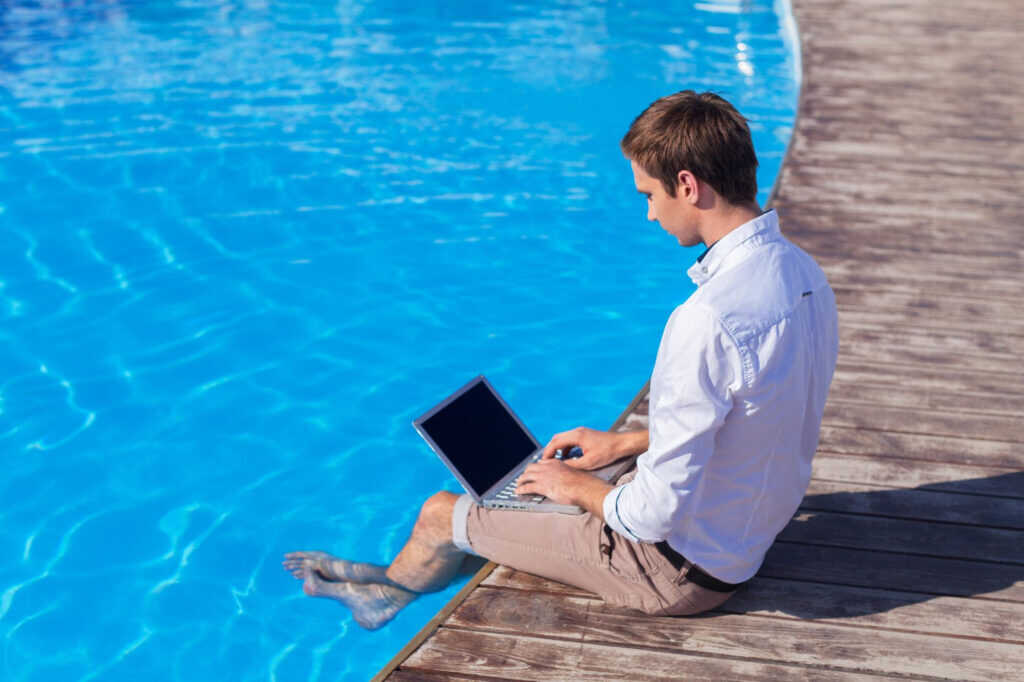Learn the key differences between virtual and in-field pool route training, and understand which approach is best for your business growth in the pool service industry.
Pool Route Training: Virtual vs. In-Field
When starting a pool service business, one of the most essential aspects is training. As pool maintenance involves specialized skills, choosing the right training method can make a significant difference in your success. Virtual and in-field training are two popular options, each with its unique benefits and challenges. This blog post will compare these two methods in-depth, helping you determine which approach best suits your business needs and personal learning style. We’ll explore the pros and cons, and offer insights from industry professionals to ensure you’re fully equipped for success.
Introduction
Whether you're an aspiring entrepreneur looking to dive into the pool maintenance industry or an existing business owner hoping to expand, the need for proper pool route training is undeniable. Training plays a crucial role in ensuring that you or your team can efficiently handle various tasks, from water chemistry and filter maintenance to customer relations and route management.
When choosing the right training program, one of the first decisions you will face is whether to go for virtual training or in-field training. Virtual training provides the convenience of learning from anywhere, while in-field training offers the advantage of hands-on experience. Both methods have distinct advantages and challenges, making it essential to understand their differences before making your decision.
In this blog post, we'll break down the key features of both virtual and in-field pool route training, explore the benefits and drawbacks of each, and help you decide which method is best for you.
Virtual Pool Route Training: A Flexible Approach
Virtual pool route training has become increasingly popular, offering the flexibility to learn at your own pace from the comfort of your home or office. This method typically involves a series of online modules, instructional videos, quizzes, and video calls with trainers or mentors.
-
Convenience and Flexibility: One of the main benefits of virtual training is that it allows you to learn whenever and wherever you choose. This makes it ideal for people with busy schedules or those located far from a training facility. As you progress through the modules at your own pace, you can balance learning with other work or personal commitments.
-
Comprehensive Digital Resources: With platforms like Pool Routes Training, virtual training programs often come with a wide range of resources, including video tutorials, guides, and quizzes that reinforce your knowledge. These resources can be accessed anytime, allowing you to revisit concepts or clarify doubts whenever necessary.
-
Cost-Effective: Virtual training programs are generally more affordable than in-field options. With no travel or accommodation expenses involved, this can be a more budget-friendly choice for individuals just starting their pool service journey. Pool Routes For Sale also provides training packages that come at a reduced cost compared to industry standards, further enhancing its appeal for entrepreneurs with limited capital.
-
Reduced Hands-On Learning: While virtual training is flexible, it does have some limitations. For example, you won't have the opportunity to directly interact with pools and equipment during your learning process. This lack of hands-on experience could make it more challenging to fully grasp certain practical aspects of pool maintenance, such as dealing with malfunctions or troubleshooting water chemistry issues.
-
Limited Real-Time Feedback: Virtual training often lacks immediate, in-person feedback from trainers, which can make it harder for beginners to assess their skills in real-world scenarios. While video calls and forums help mitigate this issue, they don’t always offer the immediate hands-on guidance that in-field training provides.
In-Field Pool Route Training: Practical, Hands-On Experience
In-field pool route training involves on-the-job learning with real pools, giving trainees the opportunity to work directly with pool equipment, assess water chemistry, and handle customer interactions in a real-world setting. This type of training is commonly offered in select locations such as Fort Lauderdale, FL, and Dallas, TX.
-
Hands-On Experience: The biggest advantage of in-field training is the opportunity to apply what you've learned directly to real pools. You’ll get to perform tasks such as cleaning filters, adjusting chemical levels, and checking for leaks, which will deepen your understanding of pool systems and maintenance processes.
-
Instant Feedback and Guidance: With a trainer right by your side, in-field training offers immediate feedback and guidance. This can be especially helpful for beginners, as it allows you to ask questions and receive corrective instructions while working on actual pools.
-
Real-World Learning: In-field training helps you become more adaptable to unexpected challenges that may arise in the field. Pool maintenance can often present surprises, from equipment failures to customer-specific needs, and learning in this environment can better prepare you for these real-world situations.
-
Travel and Scheduling Constraints: One of the major downsides of in-field training is that it typically requires travel to a specific location. Depending on where you're located, this could mean additional costs and logistical challenges. Additionally, you’ll need to align your schedule with that of the training program, which could be less flexible than virtual options.
-
Higher Costs: In-field training programs tend to be more expensive than virtual training. Apart from the training fee, you may also need to account for travel and accommodation costs if you’re attending a session far from your location. These added expenses could be a barrier for some individuals, especially if they are just starting out in the pool service industry.
Virtual vs. In-Field: Key Differences to Consider
Learning Style
Your personal learning style is a crucial factor in determining which training method is best suited to you. If you're someone who thrives in hands-on environments and learns best by doing, in-field training could be more beneficial. On the other hand, if you prefer self-paced learning and value the ability to revisit content at your convenience, virtual training may be the better choice.
Location and Flexibility
Virtual training offers significant flexibility in terms of location and scheduling. Whether you're in Florida, Texas, or Nevada, you can access virtual training programs from anywhere in the world, which is a major advantage for those who don’t have the time or resources to attend in-field sessions. However, if you prefer a more structured, real-world approach, in-field training may be necessary to fully grasp the skills needed to succeed in the pool service industry.
Cost Considerations
For many aspiring pool service business owners, cost is a major factor when deciding between virtual and in-field training. Virtual training is often more affordable, especially if you're looking for a cost-effective option to start your pool service journey. On the other hand, while in-field training may offer more hands-on experience, it typically comes with a higher price tag due to travel, accommodation, and additional fees.
Support and Mentorship
While both virtual and in-field training programs offer support, in-field training provides more immediate, personalized mentorship. If you have questions or need advice while working on pools, you can rely on trainers to offer guidance in real-time. Virtual training, while offering support through video calls and forums, may not provide the same level of immediate feedback.
Which Training Method is Right for You?
Ultimately, the decision between virtual and in-field pool route training depends on your unique situation, preferences, and goals. If you are looking for flexibility and affordability, virtual training may be the right option for you. It provides comprehensive resources, flexibility in learning pace, and is particularly suitable for those with limited time or budget.
However, if you're someone who thrives in hands-on, real-world learning environments and values the personal mentorship of a trainer, in-field training might be a better fit. You’ll gain practical experience and be better prepared to deal with the challenges of managing a pool service business.
At Superior Pool Routes, we offer both virtual and in-field training options to ensure you have access to the resources you need to succeed. Whether you’re purchasing your first pool route or expanding your existing pool service business, our training programs are designed to give you the knowledge and confidence you need to excel in the industry.
Conclusion
Choosing between virtual and in-field pool route training ultimately comes down to your learning style, location, and budget. Both options offer valuable insights and resources to help you grow your pool service business, but understanding your personal preferences and goals is key to selecting the right approach. At Superior Pool Routes, we’re committed to providing tailored training and support to ensure you’re set up for success, no matter which training method you choose.
Ready to get started? Explore our available pool routes for sale and begin your journey towards becoming a pool service expert today!



